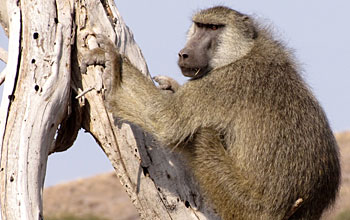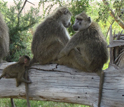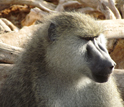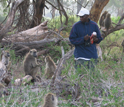News Release 12-096
Relationship Between Social Status and Wound-Healing in Wild Baboons
Findings show it's best to be "top baboon"

An adult male baboon rests on a tree near Amboseli National Park, Kenya.
May 21, 2012
This material is available primarily for archival purposes. Telephone numbers or other contact information may be out of date; please see current contact information at media contacts.
Turns out it's not bad being top dog, or in this case, top baboon.
Results of a study by University of Notre Dame biologist Beth Archie and colleagues from Princeton University and Duke University finds that male baboons that have a high rank within their society recover more quickly from injuries, and are less likely to become ill than other males.
The finding is somewhat surprising, given that top-ranked males also experience high stress, which should suppress immune responses.
Archie, Jeanne Altmann of Princeton and Susan Alberts of Duke examined health records from the Amboseli Baboon Research Project in Kenya. They published their results in this week's issue of the journal Proceedings of the National Academy of Sciences.
The scientists also found that social status is a better predictor of wound-healing than age.
"The power of this study is in identifying the biological mechanisms that may confer health benefits to high-ranking members of society," says George Gilchrist, program director in the National Science Foundation's (NSF) Directorate for Biological Sciences, which co-funded the research with NSF's Directorate for Social, Behavioral & Economic Sciences.
"We know that humans have such benefits, but it took meticulous long-term research on baboon society to tease out the specific mechanisms," says Gilchrist. "The question remains of causation: is one a society leader because of stronger immune function or vice versa?"
Although research on health and disease in animals in laboratory settings has been extensive, this study is one of the most comprehensive conducted on animals in a natural setting, the scientists say.
The researchers examined 27 years of data on naturally-occurring illnesses and injuries in wild male baboons. They investigated how differences in age, physical condition, stress, reproductive effort and testosterone levels contribute to status-related differences in immune function.
Previous research found that high testosterone levels and intense reproductive efforts can suppress immune function and are highest among high-ranking males.
However, Archie and colleagues found that high-ranking males were less likely to become ill and recovered faster from injuries and illnesses than low-ranking males.
The authors suggest that chronic stress, old age and poor physical condition associated with low rank may suppress immune function in low-ranking males.
"The complex interplay among social context, physiology and immune system-mediated health costs and benefits illustrates the power of interdisciplinary research," says Carolyn Ehardt, program director in NSF's biological anthropology program.
"This research begins to tease apart the trade-offs in both high- and low-status in primates--including ourselves--which may lead to a new understanding of the effects of social status on death and disease."
-NSF-
-
Baboons resting on a log near Kenya's Amboseli National Park.
Credit and Larger Version -
Team of field assistants observing baboons in Amboseli National Park.
Credit and Larger Version -
An adult male member of the Amboseli baboon population.
Credit and Larger Version -
Field assistant Kinyua Warutere watches wild baboons in Amboseli.
Credit and Larger Version -
Who's watching whom? Field assistant Kinyua Warutere with baboons.
Credit and Larger Version
Media Contacts
Cheryl Dybas, NSF, (703) 292-7734, email: cdybas@nsf.gov
William Gilroy, University of Notre Dame, (574) 631-4127, email: william.g.gilroy.6@nd.edu
The U.S. National Science Foundation propels the nation forward by advancing fundamental research in all fields of science and engineering. NSF supports research and people by providing facilities, instruments and funding to support their ingenuity and sustain the U.S. as a global leader in research and innovation. With a fiscal year 2023 budget of $9.5 billion, NSF funds reach all 50 states through grants to nearly 2,000 colleges, universities and institutions. Each year, NSF receives more than 40,000 competitive proposals and makes about 11,000 new awards. Those awards include support for cooperative research with industry, Arctic and Antarctic research and operations, and U.S. participation in international scientific efforts.
Connect with us online
NSF website: nsf.gov
NSF News: nsf.gov/news
For News Media: nsf.gov/news/newsroom
Statistics: nsf.gov/statistics/
Awards database: nsf.gov/awardsearch/
Follow us on social
Twitter: twitter.com/NSF
Facebook: facebook.com/US.NSF
Instagram: instagram.com/nsfgov







